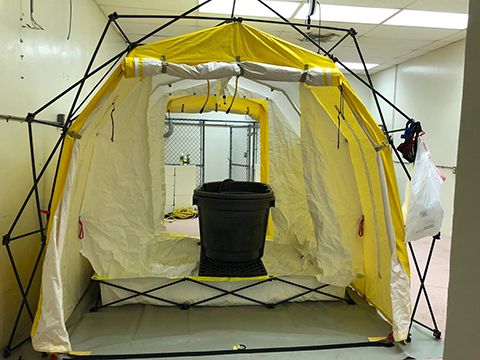Based within an academic institution, members of the Texas A&M Veterinary Emergency Team (VET) are engaged in research that helps improve emergency response to animal issues during a disaster. Developing evidenced-based decontamination protocols and risk communication strategies, as well as identifying new methods to keep working dogs safe during search-and-rescue efforts, helps advance the knowledge base for emergency responders.
Finding Solutions to Challenges
We are committed to the development of new knowledge through research.

A tent set up with tubs is used to prevent contamination of nearby personnel or structures from wash spray or canine shaking. In this picture, an actual tent was used, but if necessary, tarps, plastic sheeting or other materials could be used to provide protection from wash spray and shaking from the process.
Our team has participated in research projects focused on:
- risk communications,
- emergency response education,
- animal decontamination,
- predictive modeling, and
- prevention of heat stress in search-and-rescue animals.
Our collaborative projects involve partners from:
- Agencies, colleges, departments, and centers across Texas A&M University and the Texas A&M University System,
- University of Pennsylvania School of Veterinary Medicine,
- Cornell University College of Veterinary Medicine, and
- multiple state agencies.
Protocols for Decontamination of Companion Animals
The VET has developed protocols for decontaminating dogs after disaster events. Published in the journal Disaster Medicine and Public Health Preparedness, the guidelines help disaster management teams across the country know the kinds and quantities of resources needed to clean external contaminants, such as toxic chemicals, off companion animals. The guidelines also offer instructions for how to set up decontamination (decon) stations and clean animals effectively with special bathing techniques.
